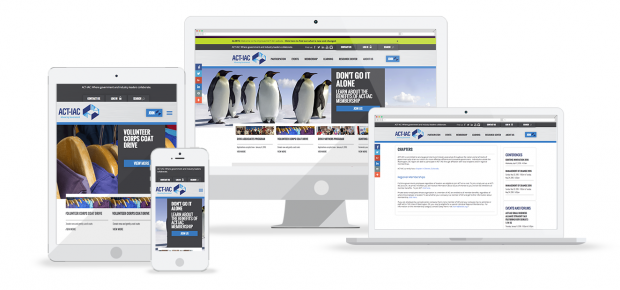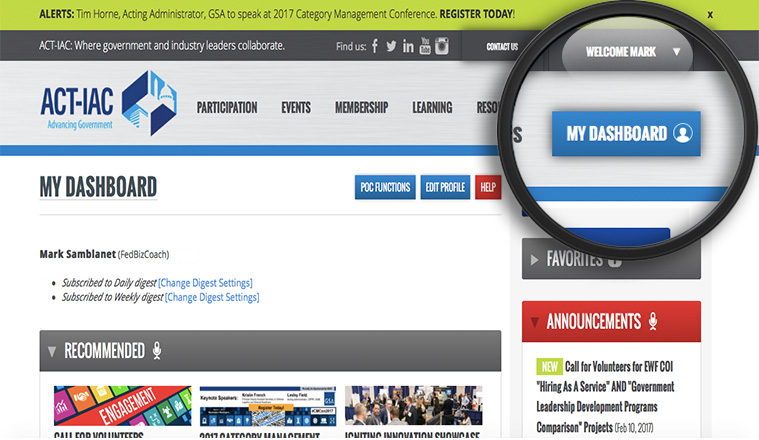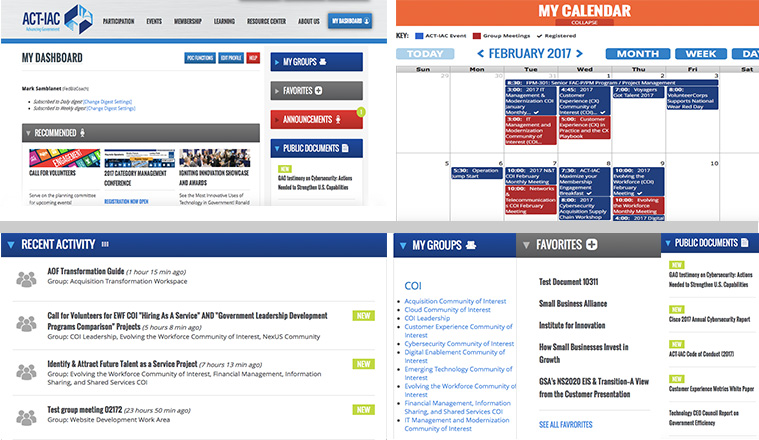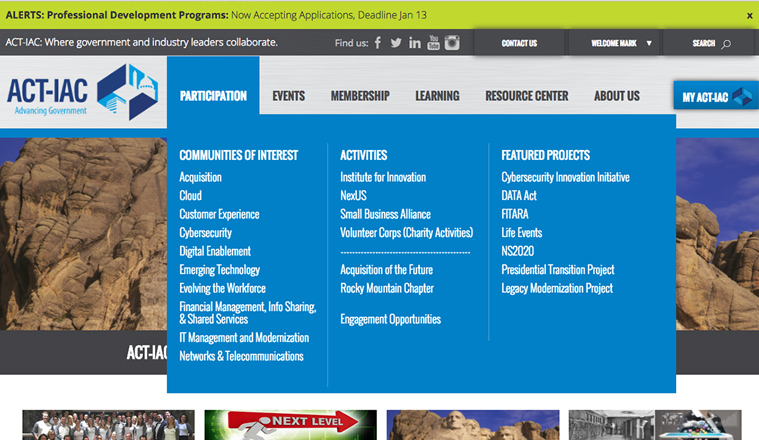 Support for Drupal 7 is ending on 5 January 2025—it’s time to migrate to Drupal 10! Learn about the many benefits of Drupal 10 and find migration tools in our resource center.
Support for Drupal 7 is ending on 5 January 2025—it’s time to migrate to Drupal 10! Learn about the many benefits of Drupal 10 and find migration tools in our resource center.The American Council for Technology-Industry Advisory Council (ACT-IAC) is a 501(c)3 non-profit educational organization established to improve government through the effective and innovative application of technology. ACT-IAC provides an objective, trusted, and ethical forum where government and corporate executives communicate, collaborate, and learn.

When New Target started this project, ACT-IAC was having software integration and user experience issues between their Drupal-based website and their association management software, netFORUM. Users and events were not getting synced between the systems, user profiles were being disabled, and data syncing in general between the two systems was being disrupted. New Target’s first task was to stabilize the website / AMS integration and fix the coding issues before we started new user experience design and development efforts.
The ACT-IAC website inherited by New Target was already in Drupal 7. Given the highly technical integration with 3rd-party software that ACT-IAC required, Drupal was chosen originally because the extant APIs within the modular system provided the best platform for the organization. The modularity and open architecture opened a wide array of options for the design of the user interface which was especially important for this project. New Target’s user-centered design experience and integration coding experience within the professional association market fit perfectly with the vision that ACT-IAC had for their website’s next evolution.
It was particularly important to the client that the website be focused around the member experience in terms of both look and usability. New Target discovered, through research and discussions with ACT-IAC members and staff, that since the primary users are government IT personnel and private sector vendors, a technology vibe was deemed best for the interface. Before designing the site, New Target considered a few things which confirmed that staying in Drupal was the best choice, including, 1) Content: Their site has a lot of interplay between public and private content and this information is made visible to various groups; 2) Audience: ACT-IAC’s audience is varied and is comprised of both very savvy users and those who are not as technically proficient; and 3) Events, programs, and groups: The client hosts a large number of events, programs, and groups that have to be properly managed and displayed.
ACT-IAC views their website as a portal for collaboration across their members and through their groups. They encourage members to join groups and share information, so they wanted the site to be directed toward these topic-specific and event-focused communities. Since members are able to choose between many groups, events, and pieces of content, the client wanted to offer customization where members could organize content and calendars in a way that would be useful for their needs.

We answered that call by creating a personalized experience through a redesigned dashboard where users can bring in the information they want along with a variety of widgets. The dashboard is customizable and gives members an activity feed for their groups and it shows, through a calendar, the events for which they have registered. This information is funneled into daily and weekly digests of updated content within the areas that the member has shown interest.

Since the site is very much redesigned around the members, it was important for ACT-IAC to educate the users on how to use the site in order to get the full experience. Training was conducted through the help of documents and also through a series of videos that reside on the site. Overall, the user-centered design coupled with the modules that we consolidated and built—which support single sign-on, event syncing, and file sharing—comprise the engine that now powers ACT-IAC’s online member experience.
Front-end design:
Our team spent significant time researching the client’s member flow, looking at dashboards and groups, and ensuring that members are able to access and find files. Given the demographics of the members, we incorporated appropriate textures, treatments, and photography. Keeping in mind that ACT-IAC wanted to provide better marketing opportunities and increase user engagement, we designed a new menu and reworked the navigation flow which makes it easier for members to find the information they need and to share it. Additionally, users are given a preview of information about major topics before they click through to the secondary pages. Panels was used for laying out pages and because of the large amount of content, Mega Menu was used to create columns of menu items. WebForm enabled the creation of a fair amount of event registration forms. One result of these efforts was a decrease in the bounce rate by about 15% year-over-year.

Back-end development:
New Target worked with the client’s AMS vendor to discuss and plan the services they needed and how everything was architected in Drupal. New Target optimized the ACT-IAC site by moving a great deal of data to the netFORUM AMS—including user profiles, event registration, and payment. The robust functionality of the site required that we enable 245 modules, and New Target’s Drupal developers wrote 20 custom modules as well. The results included a decrease in page load time by approximately 40% year-over-year.
We used the Abila module, and as members log in and find content, it’s now a full file management system with roles and responsibilities. To further add to the personalization, we implemented an Add to Favorites button that allows users to add a list of favorites on their dashboard. Workbench was used for workflow management and Filedepot was used for file management which, through its features, provides organization and structure for the files. It also allows group admins to set permissions for files and allows permissioned users to be notified when files have been edited or downloaded. Apache Solr and Facet API were used for search functionality and filtering and because a great deal of content is for members only, Apache Solr Access allows for restricted search results. Since some of the groups are very active and produce updated content frequently, while others do not, Views with customized fields was used as it provides flexibility in identifying the timeline on new content.
Integration/migration:
We integrated with Abila netFORUM for the AMS solution. The client’s site was in Drupal 7 when the project began, so our role was one of optimizing code and increasing integration performance.
Custom module functionality included:
- SSO (Single sign-on)
- Sync events between netFORUM and Drupal
- Sync user profile information
- FileDepot (filesharing)
Technical specifications
The client was already using quite a few modules, and we were tasked with cleaning, fixing, and ensuring they were being used properly. Omega was chosen because it is responsive right out of the box and it’s very basic so it can be customized. Content Access was used for permissions management, and the Panels module was used for front-end content organization because it handles complex design well and is configurable with other modules including Omega.
We used a contributed netFORUM module, which catered to only some of ACT-IAC’s needs, so our team wrote 20 custom modules. These custom modules were created to solve integration issues and shortcomings and allow for other enhanced features to meet the business requirements.
Joe Frye
Sarat Tippaluru
David Loor
Chris Jurchak
Sateesh Nutulapati
Suzana Beslic
Irve Towers
Akira Koide